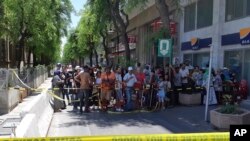One person died and four others were wounded in separate explosions in the center of the Tunisian capital, Tunis, Thursday. The bombings coincided with news that the country's ailing president, Beji Caid Essebsi, was hospitalized in critical condition for unspecified reasons.
An eyewitness recorded the aftermath of one of the two bombings near the French Embassy in the center of the capital, Tunis, Thursday afternoon, shouting that a strong explosion had struck the area.
A suicide bomber also detonated an explosive belt near a security forces counter-terrorism center. Pictures from the scene of the blast showed a police vehicle riddled by shrapnel. At least one police officer died in the blast, in addition to the bomber.
Tunisian Prime Minister Youssef al-Shahed told journalists not far from the site of one of the blasts that terrorists are trying to disrupt both the economy and the political life of the country.
He says it was a cowardly terrorist act that ended in failure and that the terrorists were trying to cause political chaos in the lead-up to presidential elections in the fall, in addition to wrecking the economy by blowing things up on the heels of the tourist season.
The terrorist attacks in the capital coincided with reports that ailing President Beji Caid Essebsi had suffered a serious health crisis and was taken to a military hospital for treatment. Reports by Arab news channels that he had died were denied by presidential advisor Firas Guefrech, who had tweeted earlier that Essebsi was "in critical condition."
People chanted outside the presidential palace, after hearing reports that the president had been hospitalized. Analysts and commentators noted that the president has not been in good health in recent weeks. It was not clear if Essebsi was stricken after hearing news of the bombings.
Egyptian political sociologist Said Sadek, who frequently travels to Tunisia, tells VOA that the Tunisian constitution calls for the constitutional court to meet if the president falls ill, but that "the body was dissolved due to political quarreling."
Sadek points out that the constitution also calls for the parliament speaker to take over for an interim period in case of the president's incapacitation, but that he is also "ailing and infirm," making it unclear who will take over. Sadek thinks that Prime Minister Shahed might try to take over during the interim – if the president is incapacitated – since he is one of the top candidates in expected presidential elections this fall.
Saudi-owned al-Arabiya TV reported that top members of parliament were due to hold an informal session later Thursday to discuss the president's health.





